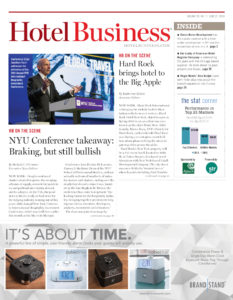MALMÖ, SWEDEN—Guest complaints are every hotel’s fear. But guest complaints about the speed and quality of the internet? In this technology-dependent world where every guest is bringing multiple devices to do work, stream videos and FaceTime friends, that’s every hotel’s worst nightmare. It’s also why the Renaissance Malmö Hotel, located here, sought out a new internet solution.
Martin Åkesson, the hotel’s GM, explained, “Even though the hotel and its equipment were quite new, [technology]had developed so much the last few years in how many devices you’re bringing on your journey when you’re staying with us. We had some complaints that the internet speed and sufficiency wasn’t good enough if you had an iPhone, iPad and a laptop connected to an access point, so we needed to add more access points to the building to get a better internet connection.”
The 128-key hotel reached out to Quadriga to discuss potential solutions. “We were already in an agreement with Quadriga and we were working quite well with them,” explained Åkesson.
He noted that guest satisfaction was the hotel’s biggest goal. “The most important criteria for us is to get the better connectivity and more happy guests,” he said, noting that WiFi and IT are much more critical today than they were a few years ago. “That was crucial—to get a fast and reliable solution for it.
“It’s getting more and more important,” he continued. “What was important 20 years ago in a hotel—to have a nice bed—is not that crucial anymore. It’s more about IT. We are more of a workplace than a resting place nowadays, which gives us new demand for having high-end, very-far-ahead technical solutions for IT. If you look at complaints today from guests, the complaints are regarding technical issues. It’s not complaints about the bed quality or the service or the room service. Hardware and technical solutions are important and critical.”
The problem for the Renaissance Malmö—which is a problem many European hotels face—is that it’s located in a listed, historic building. “We are in an old building where we can’t go through walls and ceilings with cabling,” said Åkesson, noting that Quadriga’s answer to that problem was CoCo.
 CoCo is a network solution that converts an existing coaxial TV network into IP to deliver carrier grade broadband speeds. With CoCo, all 128 guestrooms now have individual, in-room Ruckus access points and a Cisco cable modem that converts the cable signal via a single head end in the basement. The solution also has real-time monitoring, said Filip Hector, sales manager, Quadriga, Sweden. “We can basically track anything happening on the network using CoCo,” he said.
CoCo is a network solution that converts an existing coaxial TV network into IP to deliver carrier grade broadband speeds. With CoCo, all 128 guestrooms now have individual, in-room Ruckus access points and a Cisco cable modem that converts the cable signal via a single head end in the basement. The solution also has real-time monitoring, said Filip Hector, sales manager, Quadriga, Sweden. “We can basically track anything happening on the network using CoCo,” he said.
According to the company, there was a small issue concerning CoCo and Cisco modems, but this was resolved with firmware upgrades from Teleste.
“It was a sufficient and quite easy way to add access points without going through walls,” noted Åkesson. “The cabling [would have been]costly and taken a lot of time.”
Hector noted that the most common concerns hoteliers have when it comes to internet access—namely the time the rooms are down and revenue is lost, as well as the additional cost of cabling and getting into the walls—aren’t a concern with CoCo. “What we do is basically use the existing cabling and just convert that coaxial cabling into an IP network,” he said.
This was the first installation of CoCo in Sweden, which was a selling point for the hotel, said Åkesson: “To be part of a pilot program was very interesting to us, of course.” Hector noted that the company now has about five CoCo installations in Sweden. “The Renaissance Malmö is for pure WiFi, and we have four others using CoCo for delivery for the TV systems,” he said, “so we are connecting all the TVs to CoCo and from that, using the smart functions in the TV.”
According to Hector, in order to complete the transition, the hotel only had two hours of planned downtime during a low usage time period. “That was when we were installing the new head end for CoCo,” he said, “and then the in-room work was pretty easy because we just connected the cable modem to the access point. It was about 15 minutes per room to do the installation.”
Åkesson agreed. “We did not have much disturbance. It was quiet and quite efficient,” he said.
The solution is currently offering a guest speed of 50-60 MB/s—the hotel has 100 MB/s fiber—and coverage/signal levels are good, said Hector. Åkesson added, “It’s fast, efficient and reliable.”
What do the guests think? When it comes to the internet, no news is good news, said Åkesson. “We don’t get complaints about internet connectivity and speed,” he reported. The hotel includes a question about it on its guest survey to evaluate the perception of internet connectivity. “It’s increased dramatically in the past two to three months,” he said.
The Renaissance Malmö did receive complaints about the fee guests had to pay for internet— Åkesson noted that it’s rare to charge for internet in Scandinavia—but that was also recently changed, with Marriott Rewards members receiving free internet. “It gives us a loss in revenue in that specific area, but hopefully we gain more revenue when we are the first [choice]for guests. Free WiFi, with the better connectivity, has increased guest satisfaction a lot,” he said.
It has also created operational efficiencies as well. “Our staff doesn’t spend time anymore with guests having problems connecting to WiFi, which we had to do before with too few access points, where we had problems if you had two devices already connected,” said Åkesson. “The time-consuming part for our staff has decreased as well.” HB

